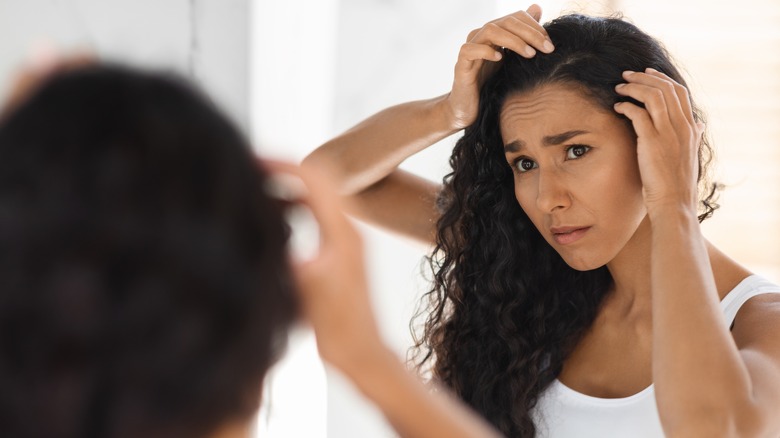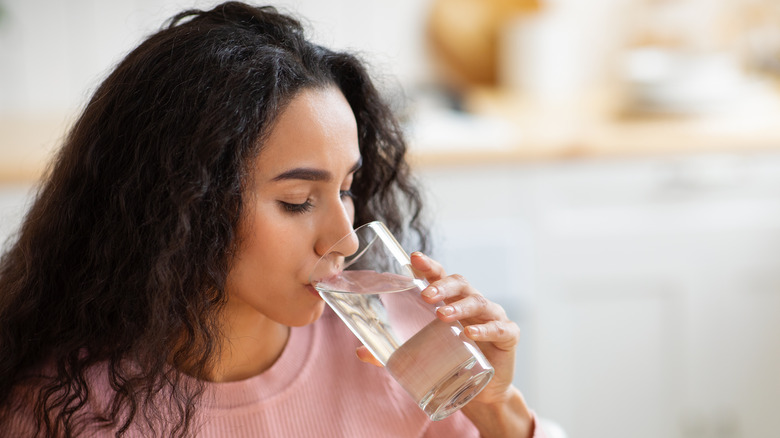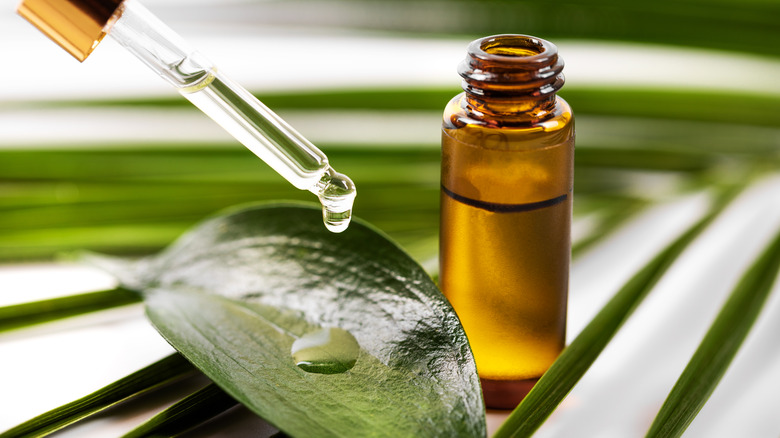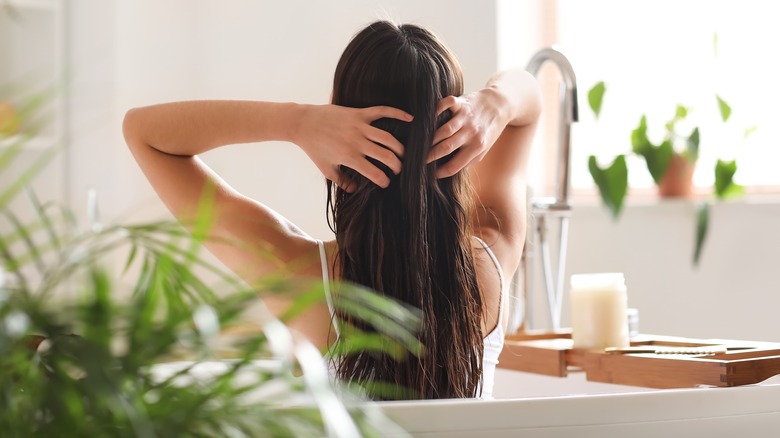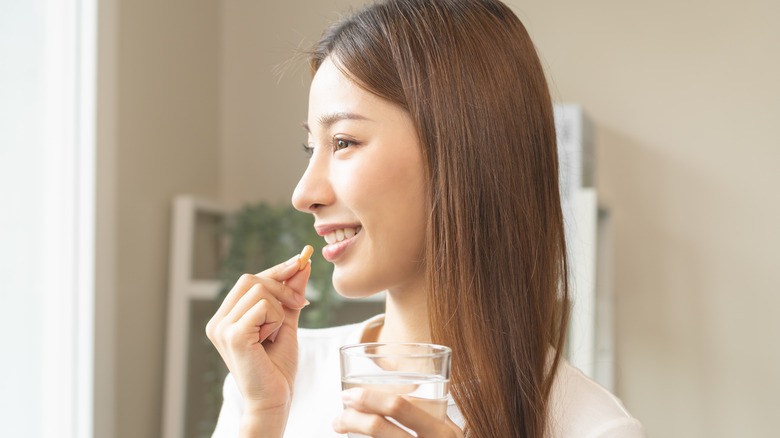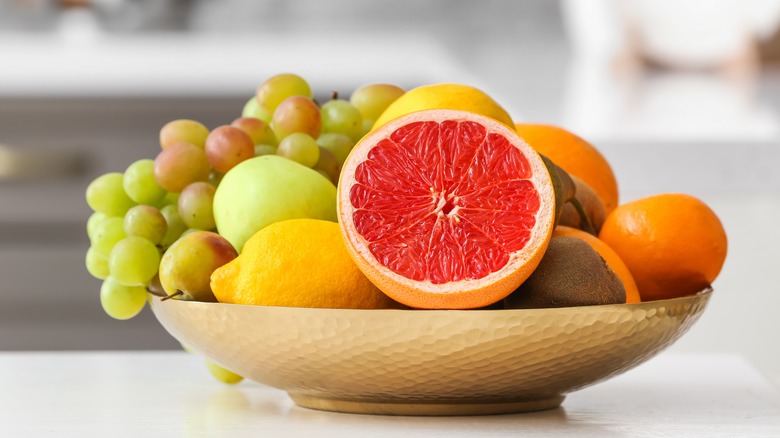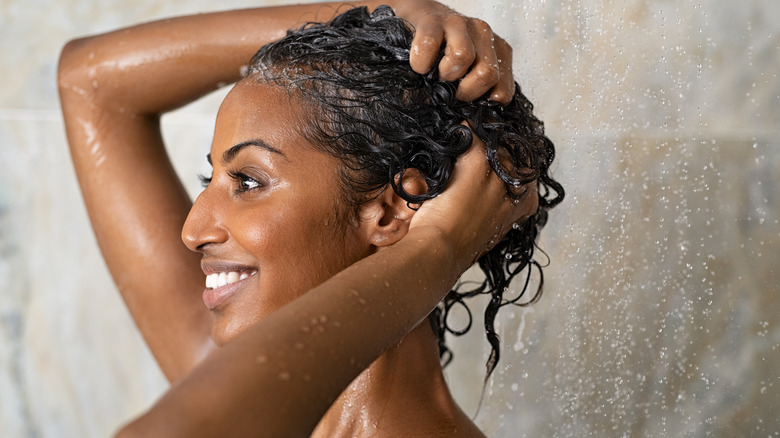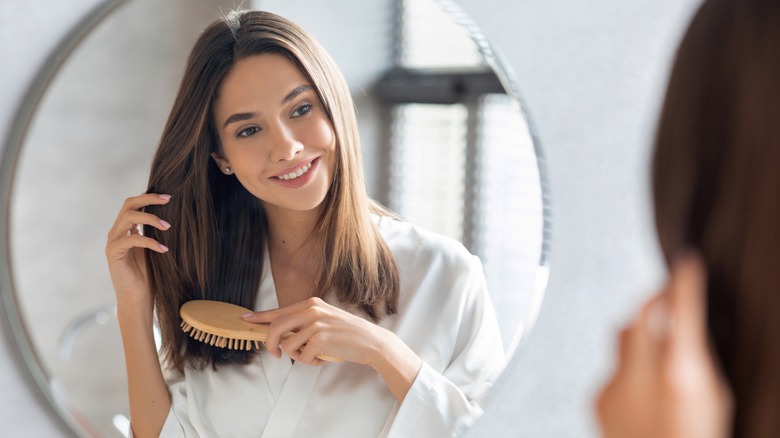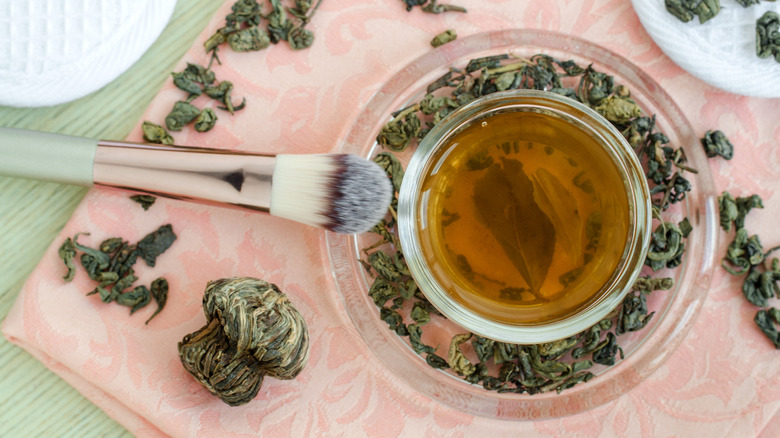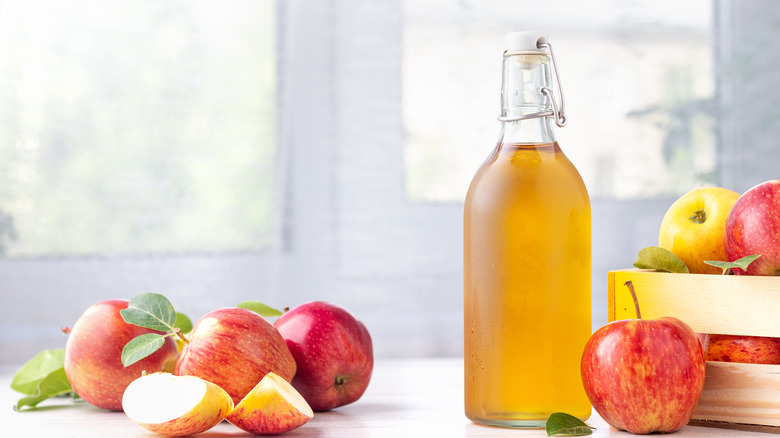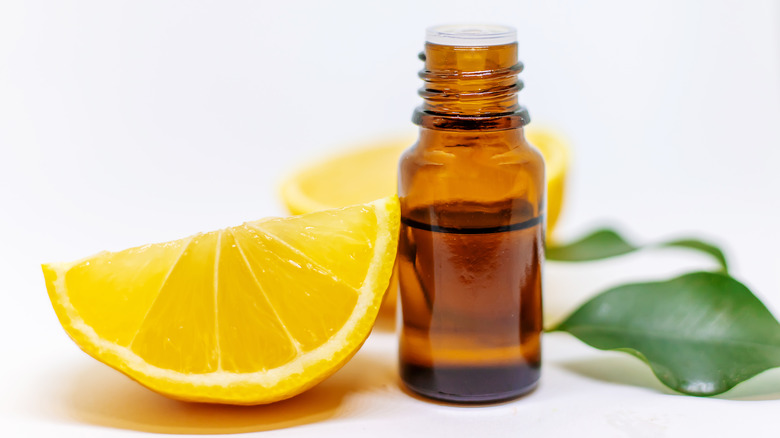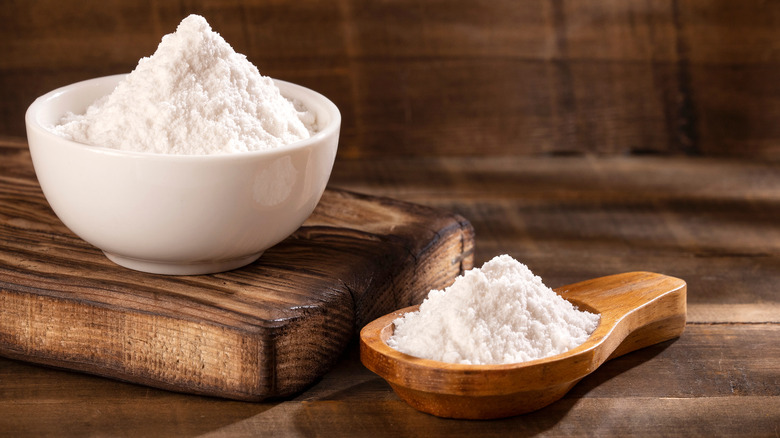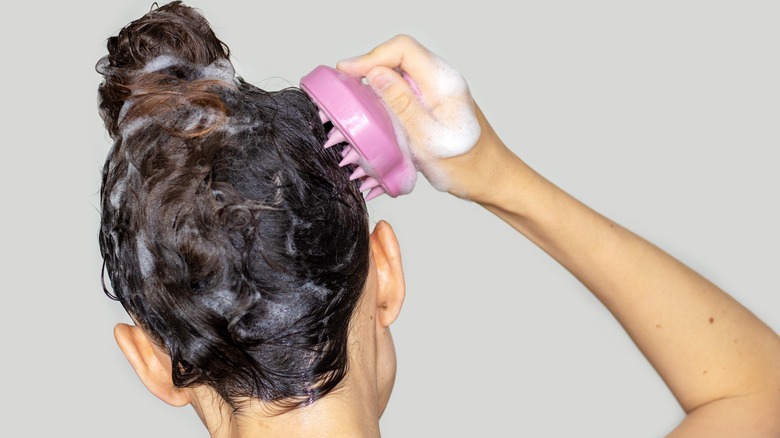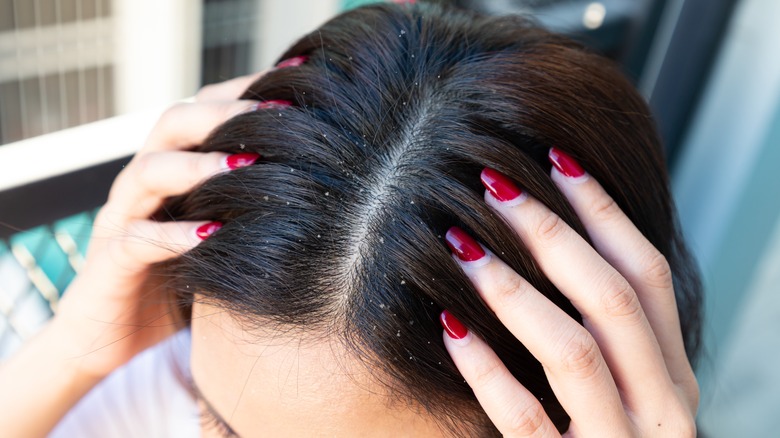13 DIY Ways To Get Rid Of Dandruff For Good
When the weather gets colder, you know what that means — cozy outfits, seasonal lattes, and ... dandruff. Cold weather is infamous for causing dry skin, and this often leads to an irritated, flaky scalp. Dandruff is not pretty, but it's a problem many of us face. According to Everyday Health, about half of the adult population has dealt with dandruff. There are different types of dandruff; some people experience a dry scalp that results in flakiness, while others have more severe dandruff caused by seborrheic dermatitis.
No matter who you are or what type of dandruff you're prone to, it's undeniable that dandruff can be embarrassing. Unfortunately, there is no definitive cure for dandruff. Treating it comes down to trial and error, and finding a treatment that works for you can get expensive if you opt for prescriptions and medicated shampoos.
However, none of the dandruff fixes you'll find here require a prescription or even a specific shampoo. In fact, you probably already have the majority of these dandruff-fighters in your cabinet at home. If you're sick of the flakes and are looking for some natural, these DIY methods may help you banish dandruff for good.
Hydrate, hydrate, hydrate
Let's start with the most fundamental part of a healthy body: hydration. We all know the benefits of drinking water — it's not only essential to your overall health, but it can improve the appearance of your skin. And since the scalp is technically part your skin, drinking water can directly influence the health and appearance of your scalp and hair. Ensuring that you're staying hydrated can lessen your chances of dealing with a flaky scalp and dandruff since being hydrated benefits your whole body (via Everyday Health).
On top of drinking enough water each day, you can also provide hydration directly to your scalp. Natural moisturizing products like, avocado oil and almond oil, are great ways to hydrate your head. Dermatologist Howard Sobel told New York Magazine, "By keeping your scalp hydrated, you cut down on the amount of flaky skin cells, which will overall decrease the appearance of dandruff."
Use tea tree oil
Tea tree oil is a multipurpose oil that comes from distilling the leaves from the tea tree. It was traditionally used by the aboriginal people of Australia as an herbal medicine and a germ-fighting substance. It's also what Meghan Markle considers her go-to multi-use product. "The one thing I cannot live without when I'm traveling is a small container of tea tree oil," she told Allure. Clearly, this oil is a powerful one — and if the Duchess of Sussex uses it, we're pretty sure it has to be good.
Commonly used for acne and fungal infections, tea tree oil can also be a great anti-dandruff solution. Dr. Marnie Nussbaum, a board-certified dermatologist, told Mane Addicts, "With its antibacterial and antifungal properties, tea tree oil is helpful in skin conditions such as dandruff (seborrheic dermatitis), psoriasis, or skin infections." Additionally, if you're someone who deals with product buildup in your hair, tea tree oil can be your new best friend. "It helps remove product buildup and moisturizes the scalp to treat dull hair," Dr. Nussbaum shared.
Lather with coconut oil and de-stress
Coconut oil may just be the holy grail of beauty products. Most of us have heard of its benefits for skin and hair, but did you know it can be a great moisturizer for your scalp, too? Dermatologist Howard Sobel told New York Magazine, "I recommend patients use a natural, extra-hydrating product like coconut oil to lather into your scalp every day." This is especially helpful for people who find themselves frequently scratching their scalp. "Scratching at your scalp will only make the symptoms more severe and lead to increased flaking and irritation," Dr. Sobel said, explaining that coconut oil can help soothe any scalp irritation you may be having.
This may be easier said than done, but you may also want to try to keep any stress and anxiety to a minimum. According to Dr. Sobel, stress can aggravate and exacerbate dandruff for some people. If you're feeling frazzled, it's important to try to manage your stress. "I advise patients to relax and moisturize to keep symptoms at bay," Dr. Sobel said.
Take probiotics
If you feel like "probiotic" has been a buzzword lately, you're definitely not wrong. Probiotics have been everywhere due to their positive effects on the body — from regulating digestion to keeping your heart healthy to even improving mental health issues. And it looks like probiotics have another use: getting rid of dandruff.
A study published in Dermatology News found that participants who took the oral probiotic lactobacillus paracasei experienced reductions in dandruff. Those who took the probiotic also noticed other bonuses for their hair, like less greasiness, irritation, and itchiness. Additionally, those who took the probiotic showed a steady decline in Malassezia, the microbe that some studies show is the culprit behind dandruff. This demonstrates that probiotics may have the ability to target the root cause of dandruff rather than just treat the symptoms, which makes it one of the best DIY fixes. One more reason to take your probiotic!
Eat more fruit
As cliché as the saying is, there is some truth to "you are what you eat." When it comes to dandruff, eating highly processed foods and those high in sugar can lead to spikes in insulin. Insulin spikes in turn lead to hormonal changes that can increase oil, which can lead to scalp irritation and dandruff, according to WebMD.
You don't have to go vegan or avoid sugar completely, but adjusting your diet a bit could improve your dandruff. "Sugars and simple carbs might promote more inflammation in our bodies, so it makes sense that eating a low-sugar, antioxidant-rich diet could help control dandruff flares," Jessica Krant, assistant clinical professor of dermatology at SUNY Downstate Medical Center, told WebMD.
Another diet change that can improve dandruff is actually eating more fruit — great news for those of us who already love fruit (and aren't super pumped at the idea of nixing sugar altogether). A 2019 study published in the Journal of Investigative Dermatology found that women, in particular, had a 47% greater risk of seborrheic dermatitis when eating a typical western diet. That same study revealed that eating a diet plentiful in fruit actually reduced the risk for dandruff by 25% for men and women.
Try a sugar or salt scalp scrub
If you suspect part of your dandruff stems from an oily scalp, you may benefit from a scalp scrub. Similar to facial and body scrubs, the goal of a scalp scrub is to cleanse and exfoliate. "Scalp scrubs can target some of the very causes of dandruff — dry or oily scalp and a build-up of hair care products, for example," Dr. Jaimie DeRosa, board-certified plastic surgeon and assistant professor at Harvard Medical School, told Bustle.
To make your own DIY scalp scrub, you'll want to first decide which ingredients to use. Dr. DeRosa recommends sea salt as your abrasive (scrubby) ingredient since it can "work to lift excess sebum/oil and products from the scalp." Sugar, however, can be a gentler option in place of salt. Next, you'll want to mix the salt or sugar with a few drops of a soothing and hydrating ingredient, like coconut oil, jojoba oil, or aloe vera. You can also add in other oils, like rosemary oil to stimulate hair growth, or lemon oil to combat excess scalp sebum (via Byrdie). Use your scrub a few times a week, and watch your dandruff start to disappear!
Stay on top of washing and brushing your hair
It may seem obvious but keeping good hair hygiene is an easy and reliable way to reduce dandruff. You may be getting mixed messages when it comes to how often to wash your hair — some say washing too frequently can dry out your hair and strip it of its natural oils, while others recommend daily washing to keep things clean.
If you're someone with dandruff, though, washing frequently is the best way to go. This is because, according to Dr. Alan Parks, a board-certified dermatologist and founder of DermWarehouse, "The longer you go in between shampooing, the flakier your scalp can get." Parks further told Today that it's important to find a balance that works for you when it comes to washing, as you may face irritation if you over-wash.
Another seemingly obvious but important anti-dandruff method is a simple one: brushing your hair. If you have dandruff, you may actually want to brush more often than someone without dandruff. "Brushing the hair more often can help distribute sebum evenly and loosen flakes," trichologist Stephanie Sey told Women's Health. However, Sey warned that you shouldn't directly brush your scalp, as that could lead to pain, irritation, and even more flakiness. Make sure to take proper care of your hairbrush, too. "You should also try to keep your hairbrush clean and free from bacteria and fungus," Sey recommended.
Use a green tea rinse
Looks like green tea isn't just good for increasing fat loss and decreasing the risk for cancer – it also has the potential to improve dandruff. "Green tea (specifically the polyphenols it contains) has antioxidant and anti-inflammatory properties and can be beneficial to the scalp when applied topically," consultant trichologist Anabel Kingsley told Byrdie. Gretchen Friese, trichologist and stylist, added, "Green tea has also been known to fight dandruff."
While drinking green tea may offer health benefits to improve dandruff, applying green tea topically in the form of a tea rinse is likely to give better results. According to Friese, "A tea rinse is an easy at-home treatment that anyone can do to help with their hair and scalp health, as well as appearance."
To do a green tea rinse, simply boil four bags of green tea in 2 cups of water, letting it steep for at least an hour. Put the cooled tea into a spray bottle, and, after washing and conditioning your hair, spray a healthy amount onto the scalp and hair. Once you've let it sit for an hour (Byrdie recommends using a shower cap or plastic bag over your hair while you wait), rinse with warm water and follow up with a deep conditioner. Friese recommends keeping tea rinses to about once per week, as you risk drying out your hair if you do it too often.
Make an apple cider vinegar rinse
Apple cider vinegar is a multiuse product that most of us probably already have sitting in our cabinets. When it comes to improving your hair and scalp, apple cider vinegar is a go-to for multiple reasons. "Apple cider vinegar can help remove build-up on the scalp, balance the pH level of the scalp and hair and help close the cuticles for shinier hair," hair expert Shab Reslan told Byrdie. Dermatologist Lavanya Krishnan agrees. As she told Good Housekeeping, "The vinegar has a certain level of acid content that decreases itching and flaking and calms down the reaction to Malassezia yeast."
To battle dandruff, mix equal parts apple cider vinegar and warm water — a cup or two should be enough to saturate your hair (via Byrdie). To get the apple cider vinegar to work its magic, massage the mixture into your hair and scalp for a few minutes. After, rinse thoroughly. You can use apple cider vinegar up to twice a week until you notice improvement.
Make a lemon essential oil mask
Lemon juice has been used as a hair lightening agent for basically forever, but can it effectively treat dandruff, too? According to Medical News Today, some scientists believe that a fungus is responsible for dandruff, so using lemon (which has antimicrobial properties) can be a way to combat it. Additionally, a 2020 review on the uses of lemon indicated that people in Palestine use lemon in combination with other ingredients as a home remedy for hair and scalp issues.
According to Byrdie, the citric acid in lemon can help to cleanse excess oil from the scalp, resulting in less dandruff. However, hair expert Shab Reslan told the publication that lemon juice may be irritating due to its alkalinity, so using lemon essential oil can be a gentler option.
To make an anti-dandruff remedy, mix a few drops of lemon essential oil with a more moisturizing agent, like honey. Medical News Today suggests making a lemon and honey hair mask by combining one part lemon juice with three parts honey, then applying the mixture to the scalp for twenty minutes. After rinsing, shampoo and condition as usual, and repeat the mask once a week as needed.
Use a baking soda scrub
According to dermatologist Lavanya Krishnan, using baking soda on the scalp can be a great way to minimize dandruff. "In a scrub, baking soda has the ability to control excessively oily scalp skin and thus, control the excess oil production," Dr. Krishnan explained to Good Housekeeping.
To better understand how baking soda can help with dandruff, you should know first that an oily scalp can lead to dandruff. This is because excess oil can lead to seborrheic dermatitis, which is a type of eczema that affects the scalp (per Everyday Health). Using an alkaline product like baking soda can help to get rid of excess oil and product build-up, ultimately leading to less dandruff.
Additionally, a 2013 study found that baking soda has antifungal properties — good news for those who suspect their dandruff may be caused by a fungus (which is certainly possible). A 2005 study of people with psoriasis found that irritation and itchiness were reduced with baking soda baths, making it a promising option for those who have dandruff due to scalp psoriasis.
Treat yourself to a scalp massage
Not only do scalp massages feel incredible, but they're also great for improving hair and scalp health, and, in turn, dandruff. Trichologist Anabel Kingsley told HuffPost, "The health of the scalp is vital to the health of the hair. Scalp massages aid in the removal of dead skin cells from the scalp — and a flaky scalp is known to worsen hair loss in certain individuals. It can be very beneficial to those who suffer from scalp conditions such as dandruff, seborrheic dermatitis and psoriasis."
Trichologist David Adams agrees that a scalp massage is a great option for improving the health of your hair. "It doesn't have to be expensive, but you can get one of those little round scalp brushes, then you massage your scalp before you shampoo it," Adams told Coveteur. "Massage the scalp in circular motions — that also encourages microcirculation and brings the blood to the surface of the scalp."
Resist picking at all costs
Out of all the DIY dandruff remedies, one of the most vital steps to take is to avoid picking at your scalp, especially if you're having a dandruff flare-up. We know, we know — once you see a few flakes, it's so tempting to try to remove every single one. But this is likely going to do much more harm than good. "The most important thing is not to pick at it or remove the scales manually, as this can worsen the condition," dermatologist Jeffrey Weinberg told Insider.
If you find yourself habitually picking your scalp, know that this is likely contributing to and worsening your dandruff. Additionally, picking your scalp can put you at risk for folliculitis, which is when the hair follicles become inflamed.
While we recommend trying out all the DIY dandruff stoppers and home remedies that your heart desires, you can always find help from a professional, too. As trichologist David Adams advised to Coveteur, "If you've tried all the home cures and you've tried every shampoo and scalp tonic, and it's still not doing something for you, then it's time to go and visit a trichologist."
